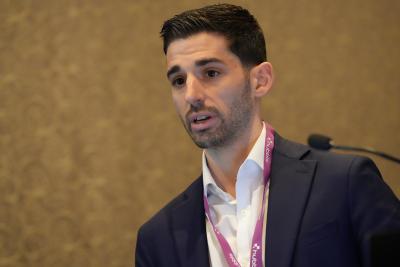Golden Equator’s Chua on Asia’s Evolving Wealth Management Dynamics

Shirley Crystal Chua of Golden Equator
Jul 15, 2019
Shirley Crystal Chua, founder and chief executive officer of the Golden Equator Group, is on an expansion drive in all the business segments of the group. But her most recent priority has been to grow the multi-family office operation, Golden Equator Wealth (GEW), to cater for the growing interest in family offices in Asia and to help facilitate efficient asset management as well as encourage structures for wealth transfer and estate succession, as Asia’s founder generations age. Chua met with Hubbis to discuss her vision for the Group, and to focus on the dynamics of the family office concept for Asia.
Based in Singapore and founded in 2012, Golden Equator describes itself as a conglomerate holding company that started in wealth management but has since grown to five businesses with an emphasis on capital, technology, and community.
The Group’s multi-family office serves clients in over 12 countries and has a diversified investment mandate covering ten markets. “We identify compelling investment opportunities and strategies, leading to long-term wealth creation and appreciation, regardless of the investment climate,” says Chua. “We have grown into an established fund management group in Singapore that keeps ahead of global and regional trends. We invest in Asia’s tomorrow.”
The firm shares that responsible investing is at the heart of what the firm offers, stating that the company’s investment managers look for opportunities that will not only drive returns, but also promote sustainability and have a real positive impact on the future generation.
Today, Golden Equator comprises several operations. They include Golden Equator Capital, the fund management company; and Golden Equator Wealth, the firm’s multi-family office; Golden Equator Consulting provides digital and tech-focused business consultancy services with expertise in Asia; SPECTRUM is a community-focused workspace; and finally Nugget is a Fintech ecosystem aimed at simplifying personal finance.
Fund management
Chua highlights that its fund management business Golden Equator Capital, through which it operates a series of different funds, holds a Capital Markets Services (CMS) licence. The funds it runs include two venture funds, two private capital funds, a prime currency fund operating like a hedge fund, and a property development fund.
“You will see therefore that we are heavily focussed on alternative assets and private equity under our fund management umbrella,” Chua notes.
Business advisory
Chua also focuses on Golden Equator Consulting, which offers advice and execution services for businesses in three stages: start-ups, companies in their high growth stage, and traditional businesses looking to transform themselves digitally to be more relevant for the future.
The family office proposition
But it is the group’s multi-family office (MFO) offering, Golden Equator Wealth, that is currently at the heart of the company’s focus and business plan for the years ahead. Currently with around 15 staff in the MFO operations, Chua and her team are keen to expand rapidly in 2019 and 2020.
“In the next few decades,” says Chua, “we will all be witnessing the largest-ever intergenerational wealth transfer – the passing down of wealth from one generation to the next – a phenomenon happening across the globe and valued in the trillions of dollars. Specifically, in Asia, this is happening for the first time and on a massive scale”, as according to research from UBS, around 85% of Asia’s billionaires are first-generation.
Expanding the reach
Chua explains that Golden Equator set up its family office business in 2012 in the aftermath of the global financial crisis (GFC). “It was a concept well developed in Europe and the US, and Australia, but new to Asia,” she recalls. “The wealth side of our business now offers the multi-family office that manages the regional wealth, with about 80% of our clients in this region as well as in Europe, but looking for opportunities in Asia. We are also increasingly having conversations with Australian families who are looking for opportunities in Asia as well.”
Following the GFC in 2009, clients' expectations toward wealth management had been changing. “Having attained a level of affluence, which requires careful and proper management, there is a desire to spend more time enjoying it and less time handling it. These ultra-HNW individuals and families have also been diversifying out of the traditional banking products, consolidating their worldwide financial affairs, and establishing an overall investment strategy to minimise risk while having integrated management with clear reporting.”
Chua explains that she and her team started Golden Equator Wealth with a clear purpose to be on the client’s side. “We want to always represent their interests in numerous situations while being the single entity they can go to for all their family legacy planning needs as well as business and financial requirements including tax planning across different jurisdictions,” she remarks.
Consolidation in family offices
She adds that managing a family’s needs - from protecting and growing their wealth to creating a legacy, to preparing their next generations to take over the family businesses and assets - requires utmost sensibility and strong business acumen, enabled by an ecosystem of complementary businesses, established industry partners, and advisers.
Chua notes that MFOs serve a vital role in centralising the management and preservation of the family fortune, allowing tax-efficient transfers of the family’s wealth; and she says they do so in an environment unencumbered by fees and product-pushing.
Succession planning a key driver
Chua believes that for wealthy and ultra-HNW families a systematic and institutionalised method of transferring wealth to the next generations is not a luxury, it is a necessity.
“A family can be easily daunted by complexities in managing wide-ranging assets that can be further exacerbated by personal complications and disputes between family members,” she comments, “but with the right infrastructure to responsibly manage and preserve wealth, including grooming and assisting the next-generation HNWIs to pursue their passion, wealth can endure.”
“Furthermore,” she reports, “Asian families prefer the neutral and unbiased advice offered by an MFO, and the confidentiality maintained in such a structure. As Asian families look to navigate this complex process of wealth preservation and succession planning, the rise of the family office and the MFO is inevitable, and we are only at the start of this wave in Asia.”
Chua maintains that being in the position to partner with a wide variety of financial institutions and industry partners also allows Golden Equator Wealth to demonstrate independence in its investment management and offerings.
She also notes that her firm offers clients consolidated statements of their positions, using both digital and manual skills. “Clients of family offices need both a holistic view and convenience,” she explains. “And it offers us a clear view as well. After all, it is natural, especially for ultra-HNWIs to spread their wealth amongst several financial institutions, particularly after the global financial crisis and the fears that came to the surface then.”
The Golden Equator vision
“There is an immense challenge in sustaining the wealth of families beyond several generations and our vision of the future of the family office, as expressed in our recent publication, Family Office 2.0 – Beyond Wealth Management. We firmly believe our approach will greatly help these wealthy families realise their goals.”
Chua explains that Golden Equator distributed the report to clients and partners to deepen the understanding on the future of family offices in the Asian region. “The understanding of the concept, and how to run a family office efficiently are still at the early stage in Asia,” she remarks.
She also explains that while the shift in focus towards succession planning and wealth preservation in Asia is encouraging, there is a gap in the knowledge on how to plan ahead and what the key considerations are.
Going private label
Private label family funds is another trending strategy for wealth governance, Chua reports. “Managing both business and family assets across locations and jurisdictions is an added complexity to wealth governance,” she explains, “and the focus for family enterprises is often on the running and management of the core business, leaving little quality time to manage their family assets professionally.”
Accordingly, consolidating family investments into a private label family fund can ensure there is independent governance of family assets away from the business assets, with a professional investment manager and with family members as the investors.
“The private label fund,” Chua notes, “also functions as a succession planning tool while developing the skills and focus of the younger family members.”
She explains that a private label fund also offers a considerable degree of privacy for the family, as well as asset protection. “It is quite simple to establish and operate, with tax incentives as an additional benefit. The family can also select a governing board of directors to provide independent management and oversight of the fund’s assets and activities.”
Seeking alternative assets
Chua also highlights the trend towards family offices investing more in alternatives as well as sustainable and ESG investing, an initiative favoured by the Millennials, for example. The asset types might include direct private equity, co-investing, venture capital, hedge funds, and real assets. “This all provides diversification as well as enhanced returns potentially,” she shares, “and away from potentially volatile public markets.”
Alongside the launch of the Family Office 2.0 publication, the firm also launched its NextGen Programme in May this year.
Reaching out to the NextGen
The Golden Equator NextGen Programme aims to mould next-generation members of ultra-HNW business families into future leaders through a highly customised curriculum across finance, wealth management, entrepreneurship, and leadership development.
“Each candidate’s learning roadmap is crafted to overcome the unique personal and business challenges as they assume their roles as custodians of the family wealth and family enterprises,” says Chua.
“In the next decade, as we know, there will be an enormous amount of wealth and businesses changing hands to the next generation. The business and wealth management landscape has been and continues to be impacted by technology. So, the next generation of enterprise leaders would require new and additional skill sets, network, and traits to manage both business and wealth.”
She explains that the series of NextGen initiatives the firm launched provides a wholesome inclusion of knowledge, unique experiences, and network access to take on business and wealth responsibilities. “We hope to revolutionise wealth preservation to help families build a sustainable legacy that lasts for many generations,” Chua shares.
Although officially launched on May 6 this year, the NextGen Programme has in fact been in operation since May 2017, and Golden Equator has a network of more than 25 NextGen individuals, some of whom are today involved in various parts of the Golden Equator businesses.
Digital natives
Golden Equator’s vision of the future wealth client is one in which the digital age dominates. “The digital age we live in now has given birth to a new cohort of technologically-savvy and digitally-connected investors,” she observes.
“As wealth gets transferred to these next generations, the landscape of wealth management and succession planning will inevitably evolve, given their digital-first nature. With the increasing sources of information at their fingertips, HNWIs and families today demand curated product recommendations and valuable insights. Furthermore, these tech-savvy HNWIs also demand secure access to their financial information 24/7 on their phones, computers, tablets and mobile devices.”
Chua also remarks that digital and algorithmic innovation as well as artificial intelligence have allowed more and more of an investment manager’s role to be delegated to technology.
“Hence, as these next-generation and millennial HNWIs grow in economic power,” she reports, “whether through their own enterprise or transfer of wealth to them, family offices will be serving a new breed of tech-immersed active investors who have been exposed to some form of robo-advisory services and have the internet in the palm of their hands making them discerning and fickle in their selection of service providers.”
All this, Chua concludes, makes it more difficult for service providers to demonstrate their value to this new breed of customers.
Different motivations
“Moreover, she says, “the motivations and life goals of the younger HNWIs differ from the older generation. Most already born into wealth, their focus is much less on creating wealth rapidly but more on chasing their passion and impacting society, also a function of their education, which often has strong Western influence. That is why family offices can no longer just rely on personal service; they must keep ahead of the digital disruption to demonstrate their value to their new breed of clients.”
Evolving the revenue streams
As to revenue potential for Golden Equator in the current and future world of wealth management, Chua explains that the group is gradually moving away from the retrocession model, with today more than 50% of revenues based on fixed fees or on a percentage of the total AUM plus an outperformance fee.
Independence
Talking about independence in the context of wealth management, Chua observes that when a family office is within a bank there can seldom be independence of thought, product and action, given internal pressure on revenues.
Financial institutions and specialist firms have the depth and expertise in specific products, she adds. The value-add in working with various banks and institutions allows family offices to recognise the strengths of each institution, to offer clients a variety of options suited to their specific needs without any feelings of conflict.
Adding value
Chua believes Golden Equator adds value on the investment front by also doing its own analysis of some of the emerging fund managers. “We make considerable effort to look into fund managers below the well-known top tier,” she shares. “In that way, we bring diversity to our clients that the banks often do not offer. To approve a new fund, the banks have to go through a massive process of due diligence and approvals, and that restricts choice for the clients. However, we assess those other fund managers through our team, based on certain parameters and metrics, and we focus on different points of access.”
The expansion drive
Chua is determined to expand, an impetus driven, she says, by two clear motivations. “First,” she explains, “we truly believe that there is a gap in the market in terms of knowledge on how to pass on the wealth, how to manage family offices because there are a lot of informal family offices around this part of world, what we can call pseudo-family offices, lacking the appropriate skills and professionalism. We also know the market is huge and only just opening up, so we believe in the power of educating the market as part of our expertise in winning new clients. This all adds up to strong motivation for us to spend the time, resources and energy to building this business.”
Chua argues that the firm’s position in Singapore offers a keen advantage. “Singapore has a brand image of great reliability,” she adds, “with excellent regulation and reputation there is a broad range of financial services and expertise, as well as a wide array of supporting services offering great expertise, whether legal, accounting, trust, custodian or whatever. And there is great political stability, all resulting in strong flows of AUM into Singapore.”
Other highlights
Amongst Golden Equator’s other notable successes of late, the firm launched a SGD120 million venture fund for South-east Asian tech companies earlier this year in partnership with Korea Investment Partners (KIP), a Korean venture capital and private equity firm.
The fund - called the GEC-KIP Technology and Innovation Fund - will invest in Series A and Series B high-growth start-ups in Southeast Asia with an allocation reserved for South Korean companies looking to expand into the region via Singapore.
Its average investment will be between SGD2 million and SGD5 million. It is supported by a number of institutional investors.
KIP will base itself at Golden Equator’s SPECTRUM offices in Singapore, which house high-growth tech businesses and also act as home to the Korea-Singapore Healthcare Incubator, which was set up in September 2017 through an alliance between Golden Equator Group and a South Korean entity, C&R Healthcare, to help Korean healthcare businesses expand into South-east Asia.
PropTech
In another deal last September, Golden Equator Capital led a SGD4 million Series A funding for Ohmyhome, Singapore’s leading PropTech (property technology) marketplace. The investment was to help Ohmyhome further strengthen its position as a PropTech market leader in Singapore and expand in Southeast Asia. Other investors for this round of funding included individuals and family offices.
Ohmyhome was launched in September 2016 by sisters Rhonda Wong and Race Wong to simplify how properties in Singapore are being transacted. The platform makes housing transactions simpler, faster, and more affordable. At the time of the funding, more than 2,000 homes had transacted through Ohmyhome, which represented a combined value of more than SGD850 million. The company is on an expansion trail through SE Asia.
Capital, tech and community
Chua concludes the discussion by focusing on some key characteristics of the firm’s wealth management business, which she says represent the group’s wider philosophy.
“I can summarise this by saying that we run our business with three important elements in mind,” she explains. “We influence using capital, and we influence using technology, and in everything we do, we aim to build community.”

Founder and Group CEO at Golden Equator







